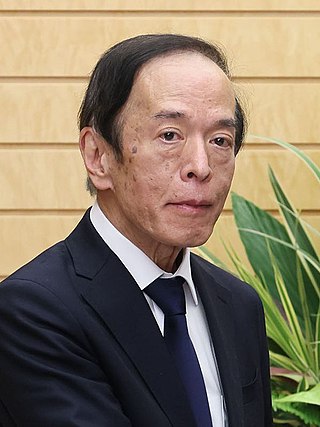
The Nikkei, also known as The Nihon Keizai Shimbun, is the flagship publication of Nikkei, Inc. and the world's largest financial newspaper, with a daily circulation exceeding 1.73 million copies. The Nikkei 225, a stock market index for the Tokyo Stock Exchange, has been calculated by the newspaper since 1950.

The mass media in Japan include numerous television and radio networks as well as newspapers and magazines in Japan. For the most part, television networks were established based on capital investments by existing radio networks. Variety shows, serial dramas, and news constitute a large percentage of Japanese evening shows.

Shinichi Kitaoka is a Japanese political scientist. He has held many roles such as the president of the Japan International Cooperation Agency (JICA), president of the International University of Japan, professor at Japan's GRIPS-Tokyo School of Security and International Studies, and Japanese ambassador to the United Nations. His area of expertise is the history of Japanese politics and diplomacy, as a political scientist and a historian.
Nagashima Ohno & Tsunematsu is one of the "Big Four" law firms in Japan.

Shonentai were a three-member Japanese boy band created by entertainment company Johnny & Associates, now rebranded to Starto Entertainment. They debuted on December 12, 1985. They were one of Japan's leading Japanese idol groups of the 1980s. The group led the annual musical Playzone from 1986 to 2008 for about 957 performances with a total attendance of over 1.38 million people over the course of 22 years.
Ōza (王座) is one of the eight titles in Japanese professional shogi.
Nobuo Ikeda is a Japanese economist originally from Kyoto Prefecture. He used to be a professor at Jobu University until 2012. His current appointments are a visiting professor at SBI Graduate School in Yokohama, Kanagawa, a lecturer at Aoyama Gakuin University, and the Chief Executive Officer of Agora Institute.
Tokushi Kasahara is a Japanese historian. He is a professor emeritus at Tsuru University and his area of expertise is modern Chinese history.
Akira Fujiwara was a Japanese historian. His academic speciality was modern Japanese history and he was a professor emeritus at Hitotsubashi University. In 1980 he became a member of the Science Council of Japan and was a former chairman of the Historical Science Society of Japan.
Kōichi Iijima was a Japanese poet, novelist, and translator. He was a member of the Japan Art Academy.

The 2014 Tokyo gubernatorial election took place on February 9, 2014 to replace outgoing Governor Naoki Inose, who resigned effective December 24, 2013. Yōichi Masuzoe was declared the winner in exit polling, with a substantial lead over the fifteen other candidates. His final tally was 2,112,979 votes (42.86%), with his two closest competitors Morihiro Hosokawa and Kenji Utsunomiya failing to break the 20% mark. Total turnout was 4,930,251 (46.14%), significantly lower than the 62.6% turnout in the 2012 election.
Susumu Takita, known by the stage name Yūsuke Takita, was a Japanese actor. He was born in Kitazawa, Setagaya, Ehara, Tokyo Prefecture. He formerly belonged to Gekidan Haiyūza.
Maki Kashimada is a Japanese writer. She has won the Bungei Prize, the Mishima Yukio Prize, the Noma Literary Prize, and the Akutagawa Prize.
Haneko Takayama is a Japanese writer. She has won the Akutagawa Prize and the Fumiko Hayashi Literary Prize, and her work has been nominated for the Nihon SF Taisho Award.

The Higashi-Ikebukuro runaway car crash was a traffic crash that occurred on April 19, 2019, in Higashi Ikebukuro, Toshima, Tokyo, resulting in 2 deaths and 9 injuries.
Novel Coronavirus Expert Meeting is a Japanese advisory body established in the New Coronavirus Infectious Diseases Control Headquarters of the Japanese Cabinet.

Kazuo Ueda is a Japanese economist who has been serving as the 32nd Governor of the Bank of Japan (BOJ) since April 2023.
Kazukiyo Nishikiori is a Japanese theatre director and actor. He is currently a freelancer. Until 2020, He belonged to the Johnny & Associates and was a member of the boy band Shonentai. Born in Tokyo. His best-known theatre performance is Fall Guy, in which he starred in 1999, and his best-known theatre direction is Ode to Joy, in 2018.
Katsuhide Uekusa is a Japanese actor and singer. Until 2020, He belonged to the Johnny & Associates and was a member of the boy band Shonentai. Born in Chiba Prefecture, Japan. His best-known television series include Wataru Seken wa Oni Bakari, a popular domestic drama that ran for more than 20 years.







